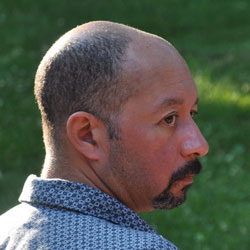Squalor of leaves. November. A lone
hornets’ nest. Paper wasps. Place where
everything that happens is as who says it will,
because. As in Why shouldn’t we have
come to this, why not, this far, this
close to
that below-zero where we almost
forget ourselves, rise at last unastonished
at the wreckery of it, what the wreckage
somedays can seem all along to have
been mostly, making you wonder what fear
is for, what prayer is, if not the first word
and not the last one either, if it changes
nothing of what you are still, black stars,
black
scars, crossing a field that you’ve
crossed before, holding on, tight, though
careful, for you must be careful, so easily
torn is the veil diminishment comes
down to as it lifts and falls, see it falling,
now it lifts again, why do we love, at all?
Notes on the Poem
How punctuation is deployed in a poem creates impacts subtle and explicit on how we read, comprehend, react and respond to the themes or emotions the poet is attempting to convey, or that the poem stirs for a given reader. How does that work in this poem from Carl Phillip's collection "Silverchest"? Even suggesting that punctuation is "deployed" in a poem has some interesting connotations. That seems to suggest that however it is arranged, that arrangement can be subject to the poet's interpretation or whims rather than to an agreed-upon set of rules with which we all abide. As this article from a writing resources web site makes clear, there are indeed rules. By first appreciating and mastering the rules, the writer can then go on to break them to unusual and even dazzling effect. In a previous Poem of the Week, we explored how a complete absence of punctuation in a poem doesn't mean that we don't or can't instinctively break up the stream of text into phrases and thoughts. Peppered as it is with periods and commas and other typographical cues, "Surrounded as We Are, Unlit, Unshadowed" has almost the opposite effect, as if phrases and thoughts are being demarcated in ways we're not used to, which comes at us in a rush right from the outset: "Squalor of leaves. November. A lone hornets' nest. Paper wasps. Place where everything that happens is as who says it will, because." This initial rush of images - none of them full sentences, although they're structured as such - feels like a torrent of emotions. That torrent is brought to an abrupt halt with the period planted where we wouldn't expect it, where the thought feels unfinished. Further in the poem, commas appear with equally surprising frequency, but to somewhat different effect: "black stars, black scars, crossing a field that you've crossed before, holding on, tight, though careful, for you must be careful," The pauses introduced by the commas suggest breathlessness, maybe trepidation, maybe anxiety ... but from the words, we know the narrator is moving forward across a familiar space. As Phillips explores the question of "why do we love, at all?" ending the poem with the only appearance of a questioning punctuation mark, the connective tissue of the punctuation that brings us to this point has proved surprisingly powerful.
